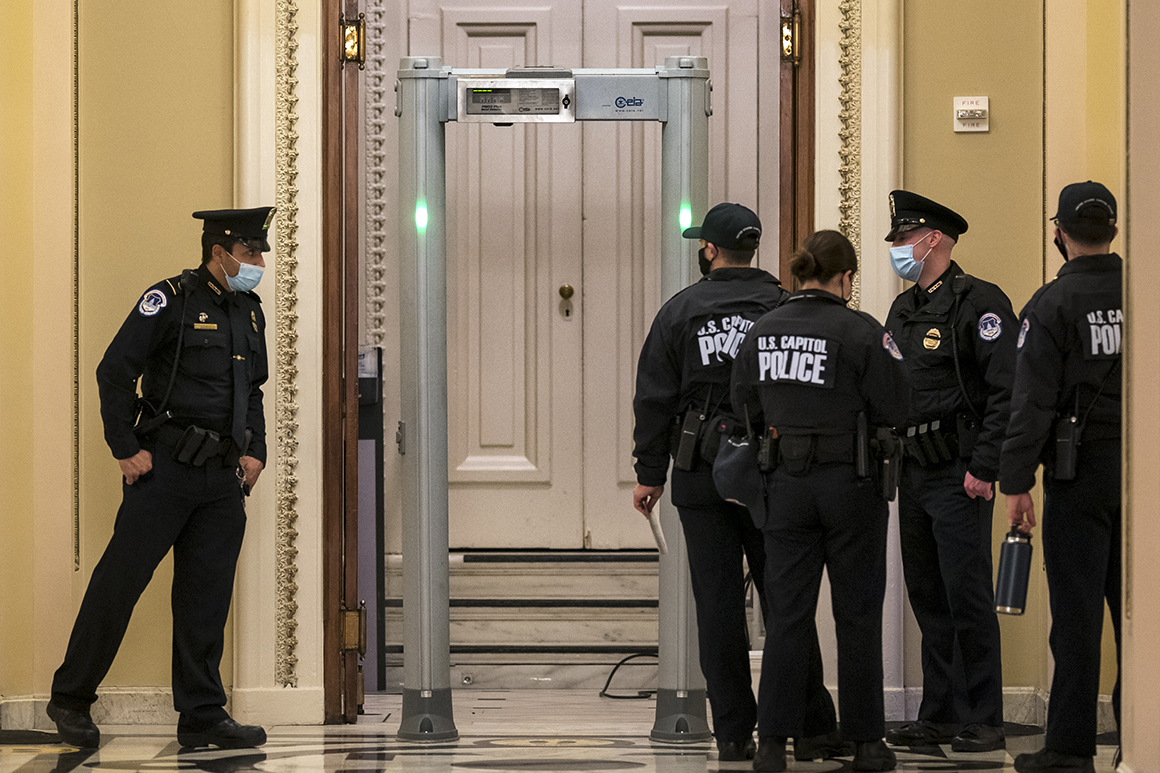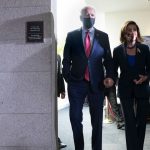The deadly Jan. 6 Capitol insurrection is nearly a month past — but the aftershocks continue to ripple through the building long considered a safe haven for lawmakers and staff.
The House took an unprecedented step Tuesday night, voting to levy hefty fines against colleagues who bypass the recently installed metal detectors that surround the chamber. The reason is simple but speaks to the new reality: lawmakers are afraid of being injured, or worse, by colleagues trying to sneak weapons on to the House floor.
The fines — $5,000 for the first violation, $10,000 for any thereafter — are just the latest security measure to be implemented in an attempt to reassure members and their staff that the House is safe. But that remains an elusive goal, lawmakers said Tuesday as they returned to a Capitol still surrounded by concrete barricades and barbed wire.
“January 6 changed us forever, and we have to recognize that we’re living, at least in the near term, in a new and somewhat complicated country,” said Rep. Dean Phillips (D-Minn.), one of 32 members who recently wrote to Democratic and Republican leadership seeking more security measures.
In the weeks since the attack, the thousands of people who work in the complex remain shaken — not just because they lived through the insurrection, but because many lawmakers and staffers say they don’t feel safe in or out of the Capitol amid rising threats targeting members of both parties.
Some members have taken matters into their own hands, purchasing security for their homes with campaign or personal funds, investing in body armor, applying for concealed carry permits or even considering moving their family. “Do I understand why more members of Congress are acquiring firearms? Yes, I do,” Phillips added, noting that he, too, has bought more security measures for his home.
Speaker Nancy Pelosi has taken multiple steps to boost protection, including appointing a task force to conduct an immediate security review of the Capitol complex. The speaker received her first briefing on that last week with the full review to be wrapped up by March 5.
Pelosi has also held discussions with her leadership team recently — including during private calls on Sunday and Tuesday — about drafting outside legislation to form a commission to investigate the events leading up to the Jan. 6 insurrection.
“The security of the U.S. Capitol Complex and all who serve and work in it is of the highest priority,” Pelosi said in a letter Tuesday evening, confirming plans to move forward with supplemental security funding and a commission to investigate the attacks.
Pelosi’s announcement to create a commission is new, but the idea has been kicked around for weeks. In fact, hours after rioters sieged the Capitol and the House resumed the election certification process on the floor, Rep. Rodney Davis (R-Ill.) had a conversation with Pelosi and House Administration Chairwoman Zoe Lofgren (D-Calif.) about launching a 9/11-style commission.
“We talked about bipartisan action to address this, to make sure it never happens again,” said Davis, the top Republican on the House Administration Committee. “But we’ll see if they take that route.”
The independent commission could also examine some of the more contentious questions about Jan. 6, including what role GOP members had, if any, in the day’s events, according to Democrats familiar with the planning discussions. The possibility of Republican involvement has continued to rattle Democrats — including Pelosi, who notably said last week that the “enemy is within the House.”
The issue of member security was also raised Tuesday during a weekly call between Pelosi’s team and Democratic chiefs of staff. The senior Democrats received a briefing from the acting Sergeant-at-Arms about additional security measures being taken to boost members’ safety as they travel to and from Washington.
Democratic aides asked how they report internal threats and what’s being done to address the massive Capitol police leadership failures on and since Jan. 6.
One staffer on the call said that they had flagged “direct” threats of violence against their boss to Capitol Police officials, but still hadn’t received a response weeks later. In at least one instance, Capitol Police have suggested that staff could work with local law enforcement if they needed urgent help. The Capitol Police public affairs office did not return a request for comment.
Members of both parties have also asked Pelosi and House Minority Leader Kevin McCarthy for more flexibility in using official funds to protect themselves, their staff and their families — in addition to more funds going forward. In 2017, the House approved an additional $25,000 for each House member’s office budget to increase security in the wake of the shooting that left House Minority Whip Steve Scalise wounded.
Pelosi confirmed in her letter Tuesday that the House will move ahead with a supplemental funding package for member security in the coming weeks, although there’s still no timeline of when that bill could come to the floor.
Some of the most high profile Democrats have been besieged with threats in recent weeks. And Republicans who voted to impeach Trump have also become high-profile targets; one pro-Trump organizer is even planning a “MAGA Sellout” tour against members seen as disloyal to Trump. McCarthy, meanwhile, has pleaded with House Republicans to stop publicly attacking each other over their impeachment votes — in part for safety concerns.
Fencing around the building is also under discussion after the acting head of Capitol police suggested last week that it could be permanent. But top lawmakers, including Pelosi in private conversations with her leadership team, have noted that Congress itself would need to appropriate the funds.
Meanwhile, lawmakers are also grappling with threats outside of the now-heavily fortified Capitol grounds — including in airports, where some members have been harassed and forced to hide in bathrooms. To that end, the House Sergeant-at-Arm announced last week that the Capitol Police would be beefing up security at D.C.-area airports and train stations.
Inside the Capitol, relations remain strained between many Democrats and Republicans after Jan. 6. Some Republicans say they’re outraged by accusations that they helped fuel the attacks, and have revolted against Democratic security measures such as the metal detectors outside the House chamber. They point out that lawmakers are allowed to sidestep security when they enter the Capitol and office buildings.
But one GOP lawmaker, Rep. Andy Harris of Maryland, tried to bring a gun to the House floor recently — which Democrats said only justified their efforts to crack down on security inside the chamber.
And Rep. Lauren Boebert (R-Colo.), the controversial GOP freshman who previously declared she would tote a handgun around the Capitol complex, circulated a letter Tuesday urging other members to oppose “unconstitutional metal detector fines.”
The fines are “an attempt to capitalize on the crisis that erupted in our nation’s capital on January 6th and unconstitutionally punish Members of Congress that are deemed political opponents,” Boebert wrote, according to a copy obtained by POLITICO.
In addition to physical security, Congressional officials are closely eyeing a less visible threat to members and staff: the looming mental health crisis. The acting Capitol Police chief told Congress that her force is struggling with PTSD; two law enforcement officers have died by suicide since Jan. 6.
The Veterans Affairs Department announced this week it will be dispatching mobile vet centers — one on the House side, one on the Senate side — to offer mental health resources to Capitol Police, National Guard and staff “in crisis.” Pelosi also announced plans Tuesday for her staff to help members tape their recollections of the Jan. 6 attacks as part of the healing process.
Some members have already opened up about their harrowing experience. Rep. Alexandria Ocasio-Cortez (D-N.Y.), who has faced of long barrage of threats in the past, not only shared her experience of trying to hide on Jan. 6 as rioters stormed the Capitol, but also revealed that she is a sexual assault survivor and that the two experiences are aggravating one another.
“I’m a survivor of sexual assault,” Ocasio-Cortez said Monday evening on Instagram. “I haven’t told many people that in my life. But when we go through trauma, trauma compounds on each other.”




















